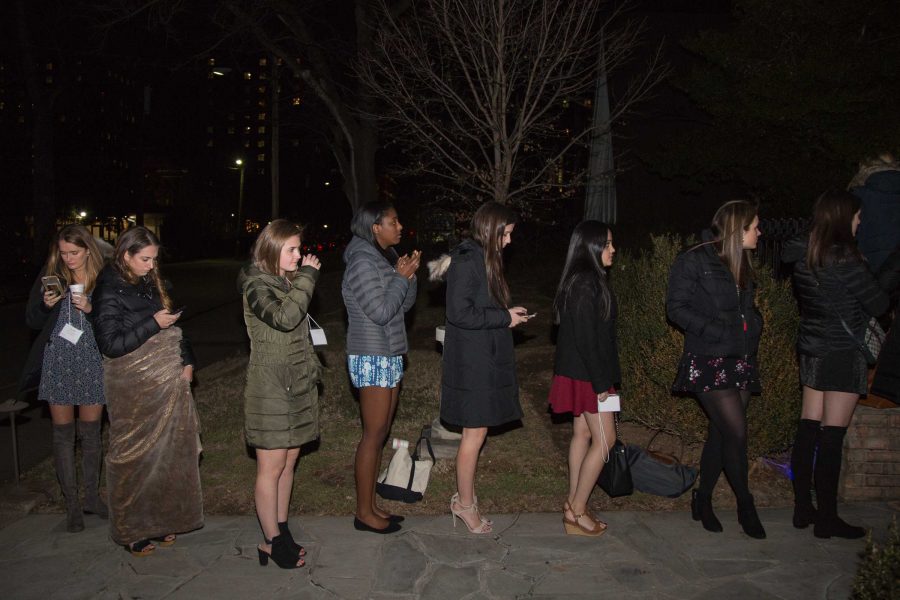Many girls at Vanderbilt look forward to Panhellenic sorority rush before they even step foot on campus. The idea of belonging to a sorority preoccupies them for months on end. They meticulously pick outfits, scout out different chapters and prepare themselves for their introductions to each house. Greek Life does have its merits: sorority membership provides sisters with a built-in community and networking opportunities. It sounds like a dream come true, and, while a lucky group of women get to reap the benefits of membership, others are not so fortunate.
Counter to what some eager students build up in their minds, rush is not always full of sunshine and roses. The process itself is utterly exhausting. Potential new members, or PNMs, return to campus early before spring semester begins, missing out on precious moments with family and friends at home. They are subjected to long days, sometimes reaching nine hours, of tiring small talk, cold weather and aching feet from hours of standing in uncomfortable shoes. The process continues into the first week of the semester. The second weekend of rush effectively takes up all of their free time, making it difficult for students to prepare for the sudden influx of homework. By Sunday night, women involved with rush are exhausted and many are behind on assignments. The process is so stressful that regardless of how appealing Greek Life may be, some women choose not to join simply to avoid having to rush. For first-year Sarah Lopez, this was the case: “I like the idea of being in a sorority, but the whole rush process is just a turn off.” If Greek organizations are losing potential members simply because the path to joining is so tumultuous, it’s obvious that there is a problem.
Many women would rather drop the process in its entirety than get stuck with “that” sorority.
Not to mention, rush can be detrimental for self-confidence. The exercise itself is designed to separate out women “worthy” of sisterhood in a particular organization. Without fail, this results in heartbroken girls convinced they are not good enough to be “top tier.” They put their hearts into the process and in return are cut, round by round, until many drop the process. Women are told at the beginning of the recruitment process that few PNMs end up without a bid, but is that really just because so many of them drop out before the affair is even over?
The tier mentality is toxic. Women feel pressured to aim for the top. New students learn very quickly which Greek organizations are supposedly “good” and which are “bad.” These notions are so firmly implanted and reinforced through gossip that many women will not even take a second glance at lower tier sororities. Many women would rather drop the process in its entirety than get stuck with “that” sorority. Particular chapters are thought of as weird, undesirable and lesser than their top tier counterparts. Women miss out on what could be a positive influence on their time at Vanderbilt simply because of how the group has been depicted. Some PNMs look down upon lower tier sororities and even discourage friends with genuine interests in them from joining. Some women go so far as to label fellow PNMs as “not top tier material,” effectively attempting to place themselves above other women rushing. And how does one quantify the tiers? Appearance? Attitude? Intelligence?
While most sororities publicize inclusivity and strive to distance themselves from the negative stereotypes of pretentious Greek Life, there are still underlying strands of superficial practices that go into the recruitment process. Take a look at any of the sororities in the upper echelon of Greek Life. While each individual’s appearance may vary, there is still a common theme: we consider these women to be conventionally attractive. In our minds, they fit the typical sorority model.
This can be disheartening for women who do not fit the mold. Exacerbating this, Greek Life has a problem with racial diversity. As a whole, Vanderbilt’s student body is 43.2 percent nonwhite. While I do not have access to the data for Greek Life, it is clear that Panhellenic sorority membership does not reflect Vanderbilt’s diversity. Women look at these top tier organizations and can perhaps single out one or two members that they can identify with. They may not consider rushing at all due to the present lack of diversity and the strong affiliation with white culture that Panhellenic sororities present.
With that said, many women attribute their sorority as a positive addition to their college experiences. Sorority sisters can become lifelong friends. Greek organizations are nationwide and can offer countless networking opportunities beyond the college campus. They also do many community service projects, allowing them to give back to communities near and far. Despite these successes, sororities need to improve upon rush and recruitment.
Some of the fixes are more challenging: they require a cultural change.
How can this be fixed? The quickest fix is to spread out the timing of rush. Nine hours of rush in one day is incredibly draining. Shortening the days would allow PNMs to be more alert and energetic when conversing with sisters. It would also provide the women with more time to catch up on both assignments and rest as the semester begins.
Some of the fixes are more challenging: they require a cultural change. Alterations need to be made in the selection process itself to foster more inclusivity and diversity. Greek Life needs to reach out to underrepresented groups and make them feel as welcome and as included as members of well-represented groups. If each member class becomes more inclusive, a diverse set of women may feel more comfortable rushing Panhellenic sororities in ensuing years. A conscious, collective effort is needed to resolve self-sorting in Greek Life.
Like the diversity problem, the tier mentality can only be mended through a broad cultural shift. Separating and ranking sororities has become so central to the Greek system that it will take years of work to tackle the elitist mentality of the tier structure. A campus-wide modification of the way sororities are pitted against each another is the only way to resolve the toxicity the tier system creates. Attention needs to be brought to these issues or Greek Life will continue to alienate women that could have both benefited from sisterhood and benefited the chapter as a whole.
Ashley Lavender is a first-year in the College of Arts and Science. She can be reached at [email protected].











